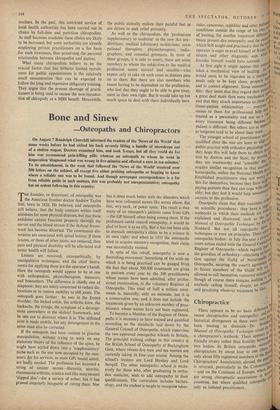Mind and Body
n -Linistry of Pensions and National In- ''ce for the purpose of sickness benefit. fretuertnanY and America are the twin sources first i which modern nature cure methods were ntr°doced to Britain. The pioneer in this whontry h was the late Andrew Pitcairn-Knowles, Was :lett° to practise here around 1910. This ma 'sa the Year when the flamboyant Bernarr Bottle naciden from the US set up his Nature Cure Pione-,1'n Buckinghamshire. MacFadden cham- Physi:, 'health culture' through the use of espeeTai exercises, manipulations, diets and prauir.4,11 Y fasting. A number of naturopathic firsC"°ners, including Stanley Lief, had their hiru experience of nature cure methods from No e_ far unsideration of naturopathy probes very s Coming up against Lief, who seem quiet' to have objected to the Sunday .papers or tilikg,iln 'the King of the Quacks.' It is a label, for 'el, he seeths to feel he can afford to ignore as 1933 Publicity it has brought. As long ago Court '3 lie stated in evidence during a High throw °n tction that he had then had 20,000 patients flow:g," his hands, and that was before the full he -bring of his reputation. In more recent years patients s said that he sometimes sees sixty aYtair, a day at his consulting rooms in he n 8 sYstem of naturopathy, during the years en iLa,.tised at Champneys, was based largely taw "'"rig, partly mitigated by fruit juices and 'ther.‘„.egetahtes; but manipulation, massage, water Ver'?, and electrical and sun-ray treatments takien:4:43 given, the usual course of treatment teucil..1.ourteen days. The names of his patients ktini"" art extract from Who's Who—Cabinet eter3ters, duchesses, painters, tycoons, judges, 1 ies and athletes. before- qualified as an osteopath in America .lire returning in 1919 to open his first Nature that1.1°,111e in England. This was so successful Roth-- "925 he took over Champneys, a former the ,„"1144 mansion, near Tring, which became N117111 centre of his work for thirty years. ihritaeeYs, described in advertisements as Premier Nature Cure Resort now therapy.' RIEFLY, psychotherapy is based on the recog- nition that the symptoms of illness—whether nervous or physical—are often precipitated by, or related to, emotional conflicts. Curiously, even five years ago, the psychosomatic approach to medicine was still being bitterly contested within the profession; now, though sceptics remain, it is generally conceded that mind and body con- stantly affect each other, and that emotional disturbances can be reflected in a wide range of physical symptoms. The chief aim of the psycho- therapist, then, is to obtain sufficient rapport with patients to enable them to discover where their emotional disturbances arise. The mere act of discovery is usually in itself therapeutic— in much the same way as confession can be, though not necessarily for the same reasons; and once patients have achieved insight into their own difficulties they may be able to pro- gress to the state where their symptoms dis- appear or at least become manageable.
Psychotherapy is practised in some NHS men- tal hospitals and, occasionally, in ordinary hos- pitals where a psychiatrist and psychiatric workers are employed. The accident that Freud was, like almost all of his colleagues, a qualified doctor, gave psychoanalysis (which is the most elaborate form of psychotherapy) a foot in the orthodox door; and in spite of much opposition and hostility it has still not been squeezed out. A patient in a mental hospital is unlikely to receive it, because it takes up so much, time; but he may receive what is agonisingly called 'psychoanalytically-orientated psycho- But psychotherapy is not yet generally taught as an integral part of the student's training (it 'treatment for refractive errors and eyesight rehabilitation.'
The British College of Naturopathy was founded in 1949; thirty-six students have now graduated from the college and a further forty- three are in training, which requires a four-year course. Students have to pay their own living expenses while taking the course, which em- braces anatomy, biology, physiology, pathology, normal psychology, psycho-pathology, dietetics (including fasting), manipulative therapy, osteo- pathy and remedial movements and case-taking. Students are trained in the 'differential diagnosis and treatment of disease, including skeletal, muscular, alimentary, respiratory, cardiac, vascu- lar, renal, endocrine-metabolic, dermatological, neurological, gynecological and pzediatric con- ditions.' The treatment of psychological prob- lems,' the college brochure adds, 'features prominently.' On graduation, students are awarded diplomas and are eligible without fur- ther examination for membership of the British Naturopathic Association.
—Psychotherapists
is creeping in, but very, slowly); and the facilities for obtaining it under the NHS are so poor that the majority of people who need it cannot get it. If they go to their general practitioner they find—as the writer of a recent EMU article, not himself well disposed to psychotherapy, admits —that 'it is a function which the physician is most reluctant to fulfil': GPs are rarely trained in it (though the seminars for GPs held by Dr. Balint, a psychoanalyst, at the Tavistock Clinic are doing a little to remedy this de- ficiency); more commonly their training has instilled in them a reluctance to dabble in matters of the mind; and they feel that psychotherapy is too time-consuming to be practicable even if it eventually brings results.














































 Previous page
Previous page